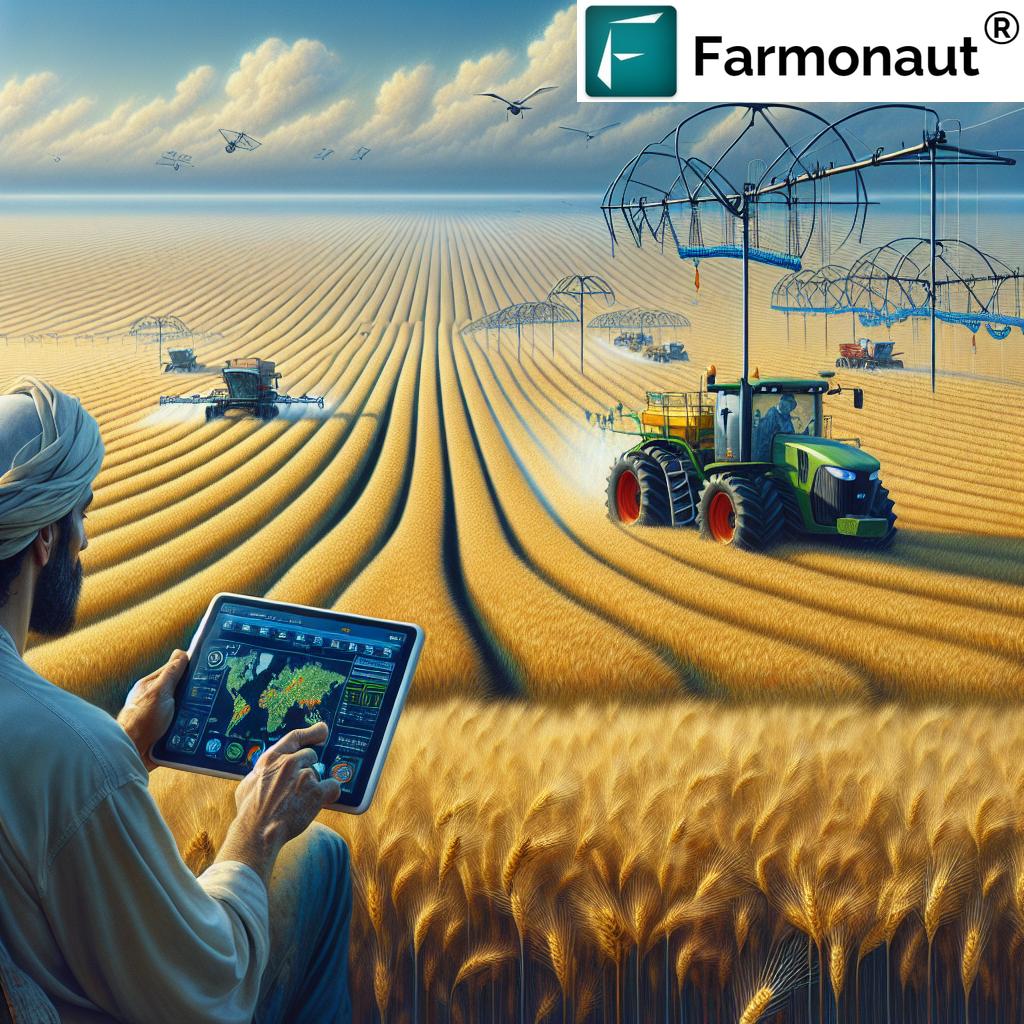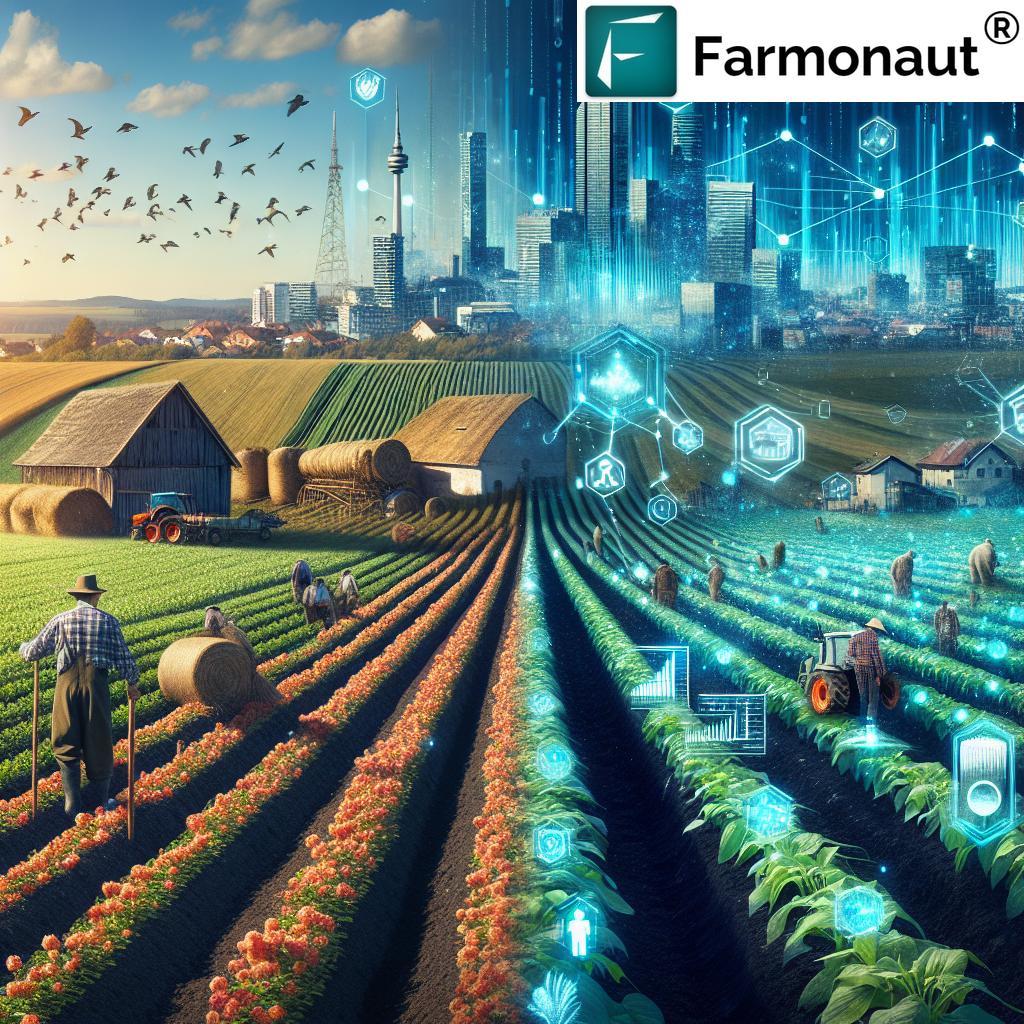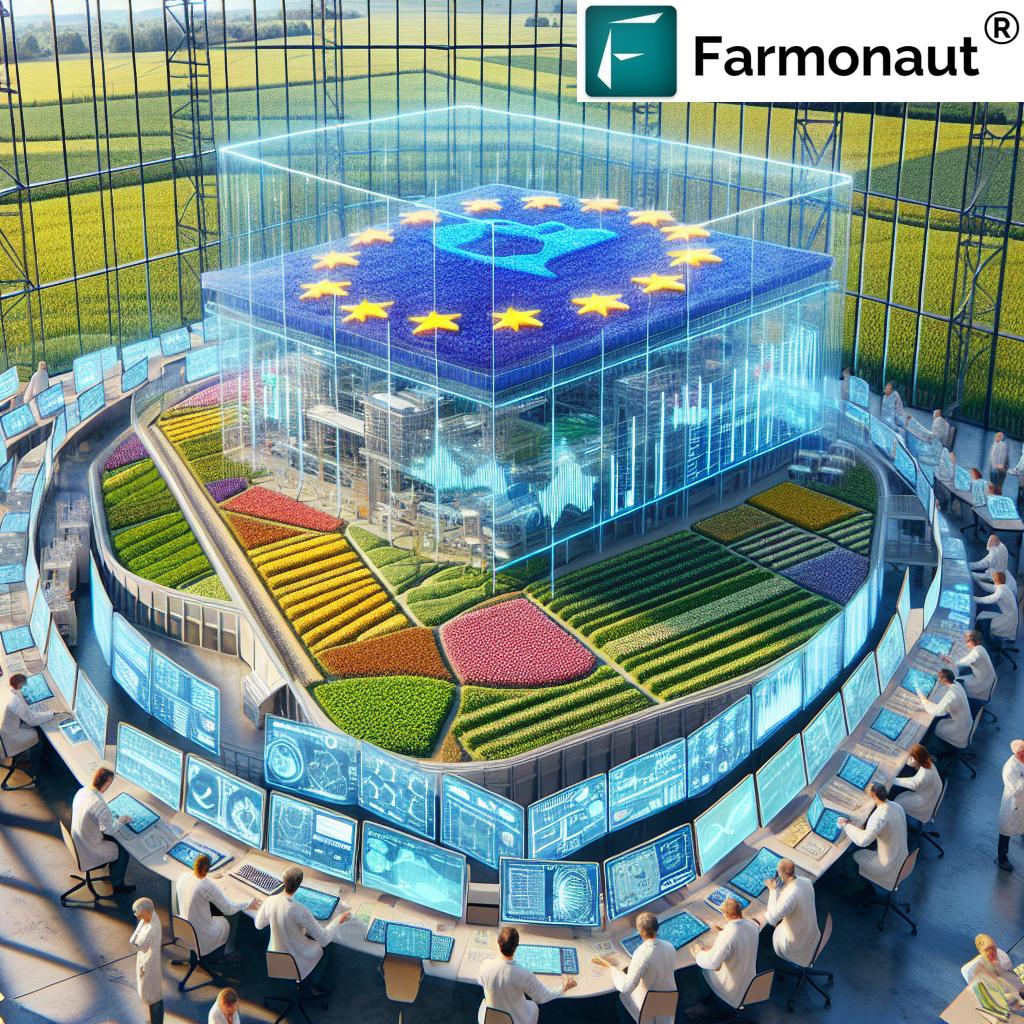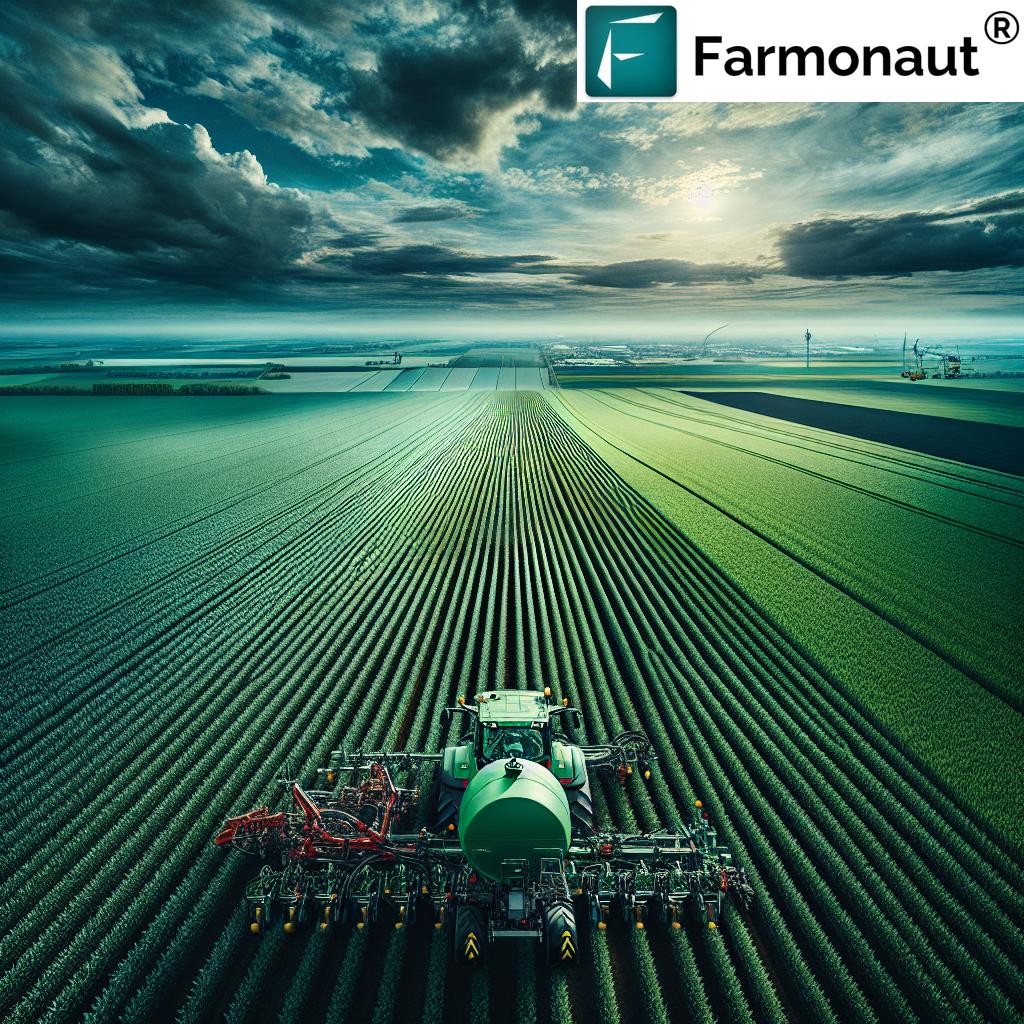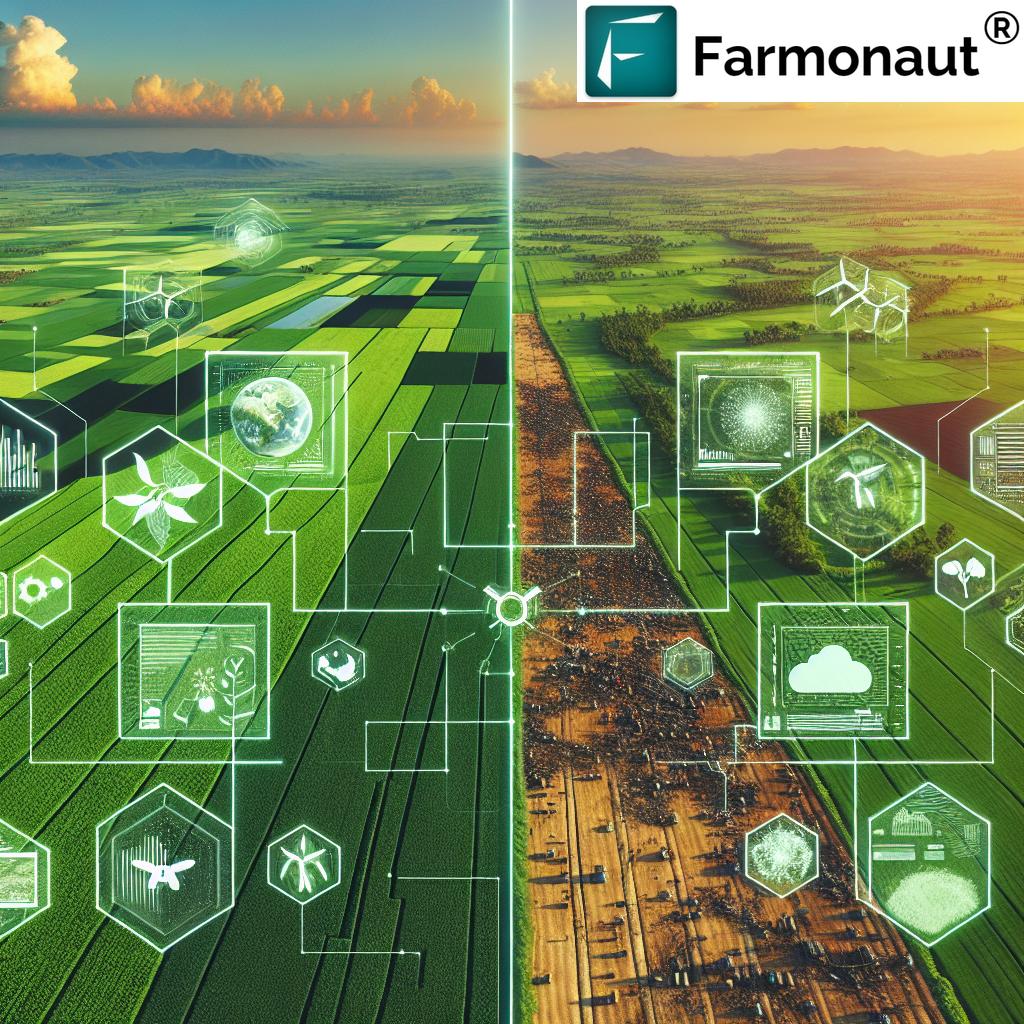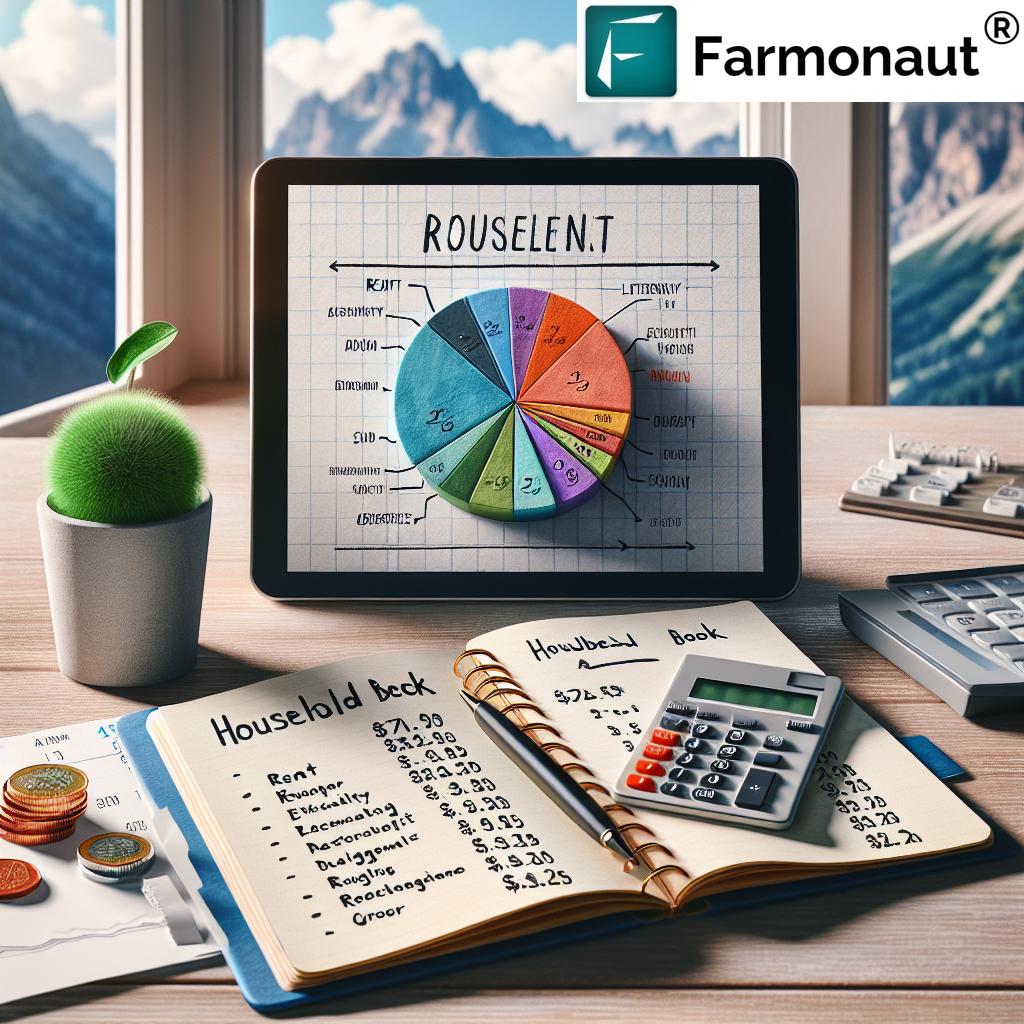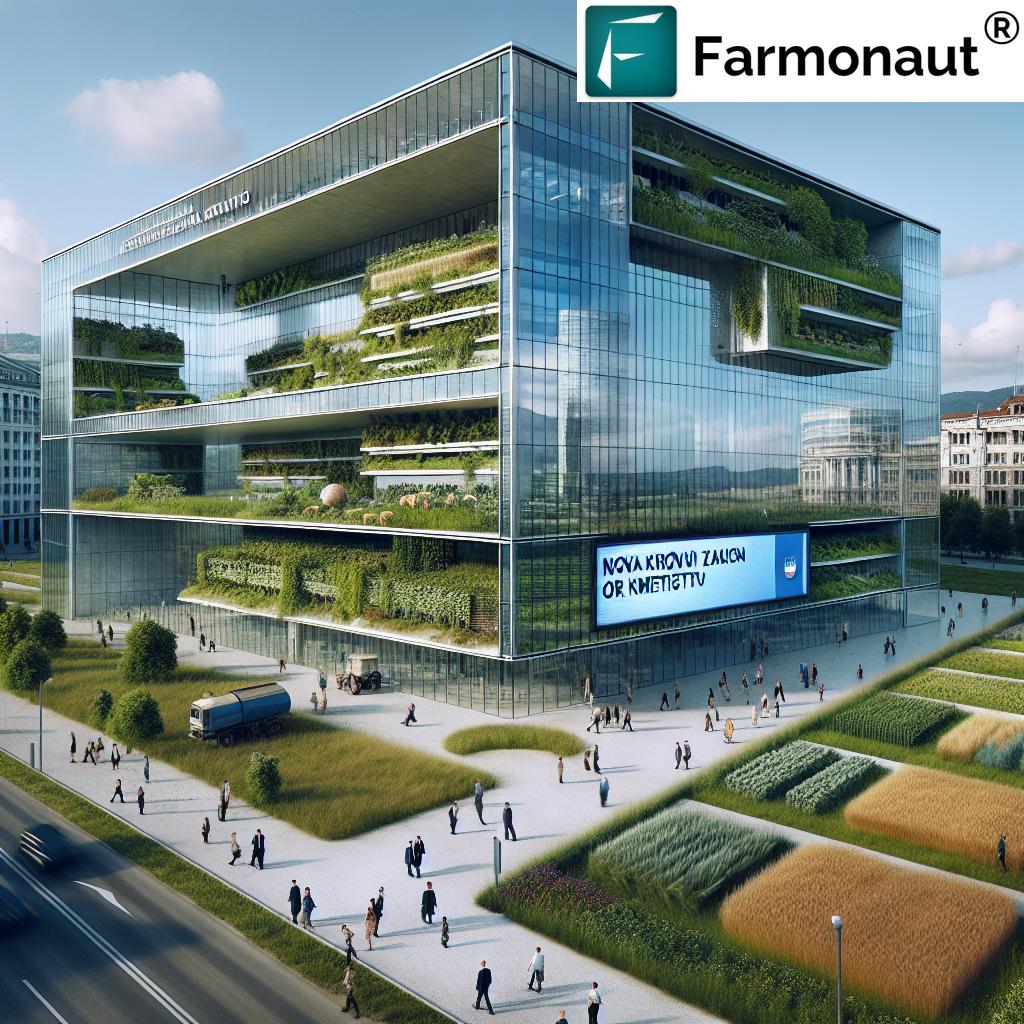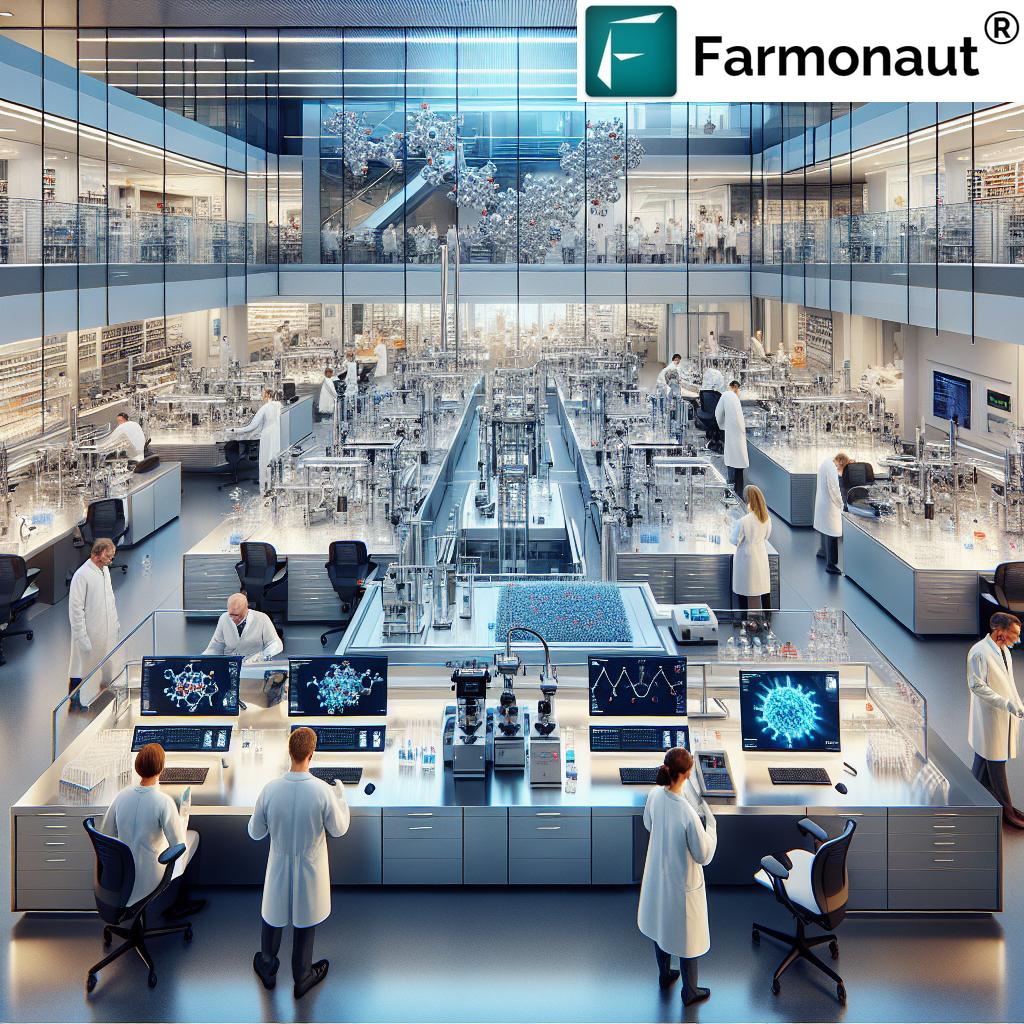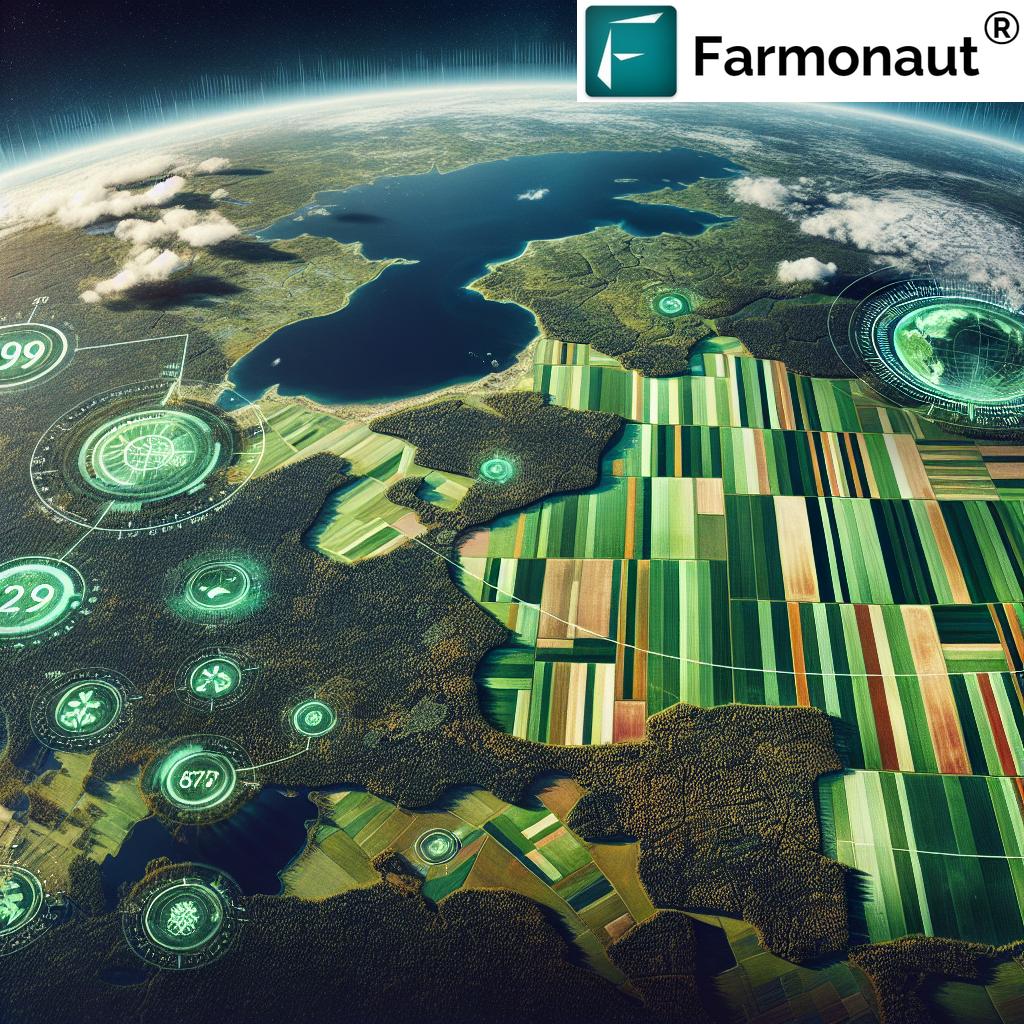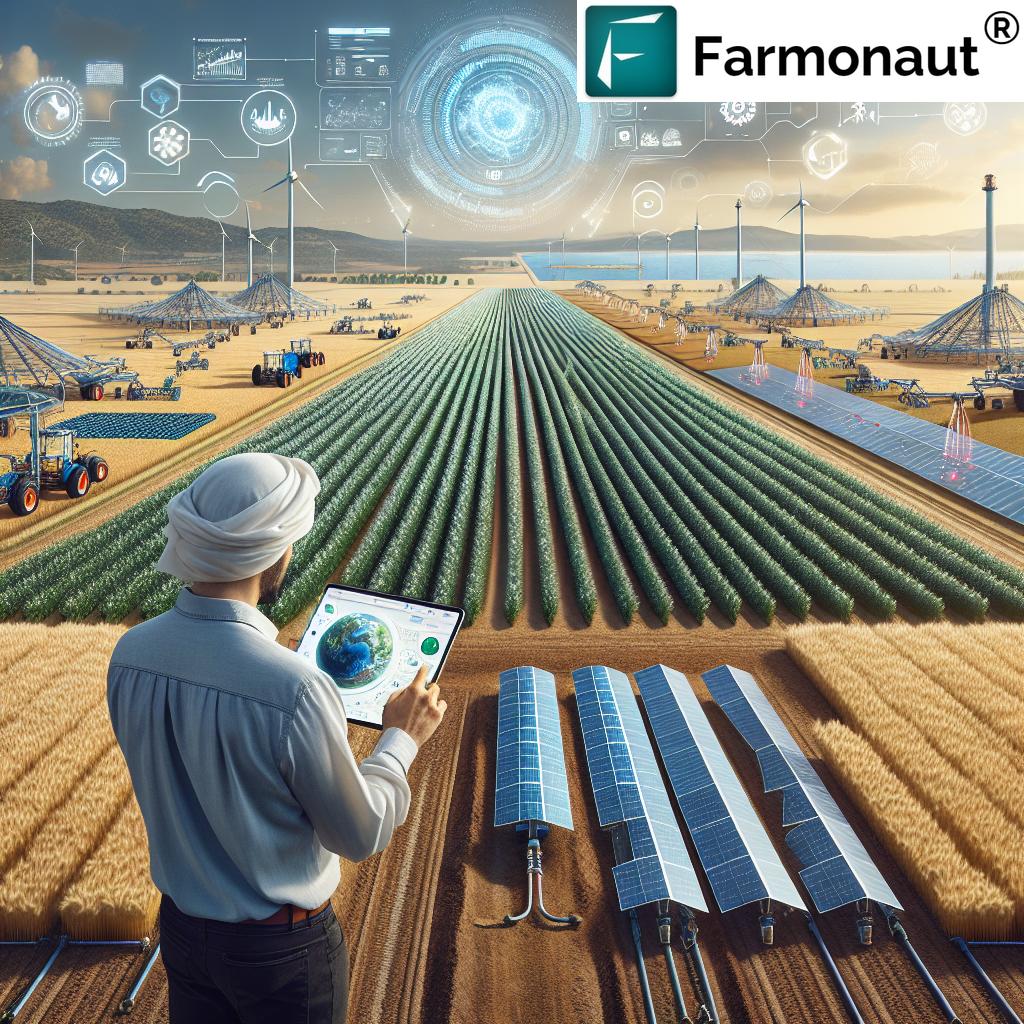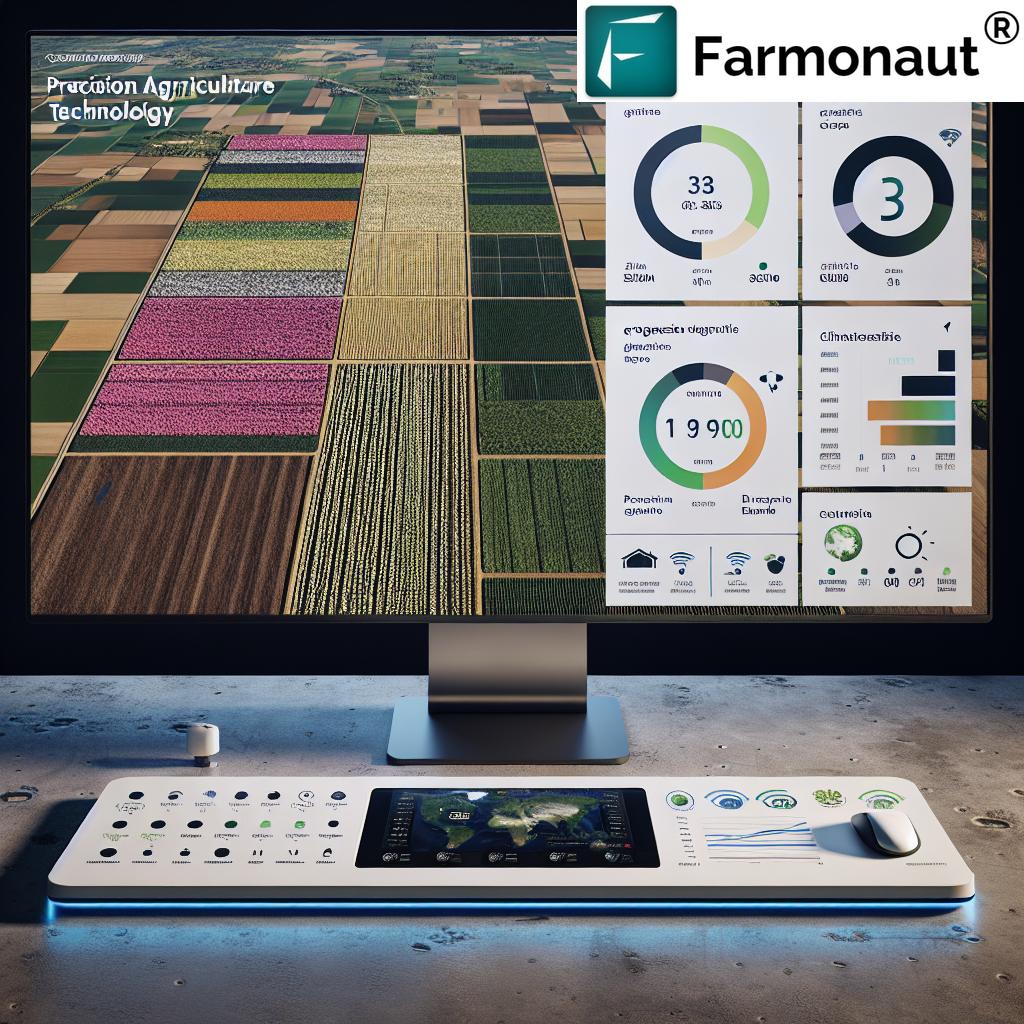Revolutionizing European Agriculture: Sustainable Farming Practices and Innovation in Ireland’s Green Future
“The EU’s Green Deal aims to make Europe climate-neutral by 2050, impacting 22 million farmers and agricultural workers.”
As we delve into the transformative landscape of European agriculture, it’s crucial to understand the pivotal role that sustainable farming practices and innovation play in shaping Ireland’s green future. At Farmonaut, we recognize the immense challenges and opportunities that lie ahead for the agricultural sector across the European Union (EU). In this comprehensive exploration, we’ll examine how the Green Deal and Common Agricultural Policy (CAP) are revolutionizing farming practices, with a special focus on Ireland’s contributions to this agricultural renaissance.
The Green Deal: A Catalyst for Change in European Agriculture
The European Green Deal stands as a cornerstone of the EU’s commitment to sustainability and climate action. This ambitious initiative aims to transform the EU into a modern, resource-efficient, and competitive economy. For the agricultural sector, this means a radical shift towards more sustainable practices that reduce environmental impact while maintaining food security.
- Reduction of chemical pesticides by 50% by 2030
- Increase in organic farming to 25% of total farmland by 2030
- Reduction of nutrient losses by at least 50%
- Reduction of fertilizer use by at least 20% by 2030
These targets present both challenges and opportunities for European farmers, particularly in countries like Ireland with strong agricultural traditions. The Green Deal’s focus on sustainability aligns perfectly with Farmonaut’s mission to make precision agriculture accessible and affordable to farmers worldwide.
Common Agricultural Policy: Shaping the Future of European Farming
The Common Agricultural Policy (CAP) is undergoing significant reforms to align with the Green Deal objectives. These changes are reshaping how agricultural support is distributed across the EU, with a stronger emphasis on environmental sustainability and innovation.
Key elements of the new CAP include:
- Enhanced conditionality: Linking direct payments to environmental and climate-friendly practices
- Eco-schemes: Voluntary programs rewarding farmers for adopting sustainable practices
- Increased budget for rural development: Supporting innovation and digitalization in agriculture
For Irish farmers, these changes present an opportunity to lead in sustainable agriculture. By leveraging technologies like those offered by Farmonaut, including satellite-based crop health monitoring and AI-driven advisory systems, farmers can optimize their practices to meet CAP requirements while improving productivity.
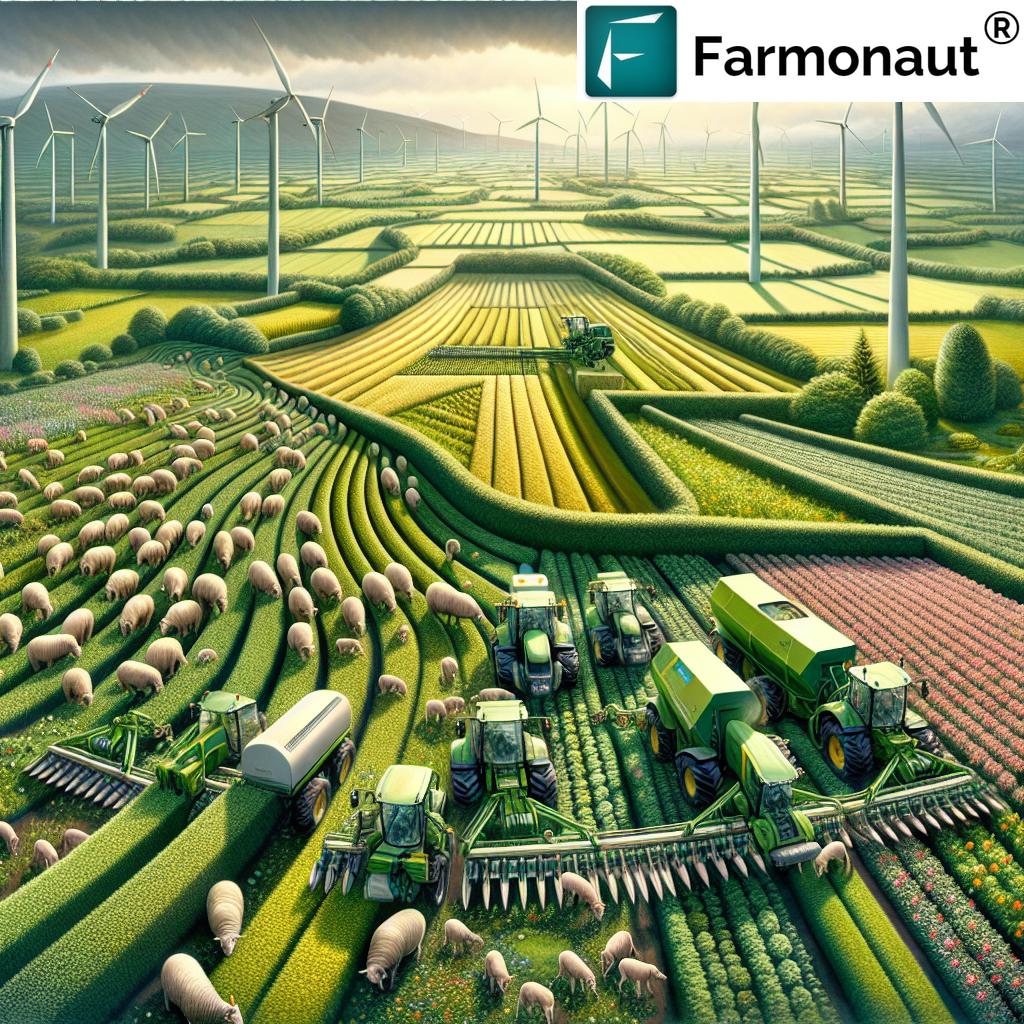
Ireland’s Green Future: Leading the Way in Agricultural Innovation
“Ireland’s agri-food sector accounts for 7.1% of the country’s GDP and 9.8% of its exports, driving sustainable innovation.”
Ireland’s agricultural sector is at the forefront of adopting innovative practices to meet sustainability goals. The country’s unique position as a major food exporter with a strong emphasis on grassland-based production systems makes it an ideal testing ground for sustainable farming practices.
- Adoption of precision agriculture technologies
- Focus on improving soil health and carbon sequestration
- Investment in renewable energy on farms
- Development of climate-smart breeding programs
Farmonaut’s suite of tools, including our satellite-based crop health monitoring and Jeevn AI Advisory System, are particularly well-suited to support Irish farmers in this transition. By providing real-time insights and personalized recommendations, we’re helping farmers make data-driven decisions that align with sustainability goals.
Sustainable Farming Practices Transforming European Agriculture
Across Europe, and particularly in Ireland, farmers are adopting a range of sustainable practices that are revolutionizing the agricultural landscape:
- Conservation Agriculture: Minimizing soil disturbance, maintaining permanent soil cover, and implementing crop rotations to improve soil health and reduce erosion.
- Integrated Pest Management (IPM): Combining biological, cultural, and chemical methods to control pests while minimizing environmental impact.
- Precision Farming: Utilizing technologies like GPS, sensors, and data analytics to optimize resource use and reduce waste.
- Agroforestry: Integrating trees and shrubs into crop and animal farming systems to enhance biodiversity and improve land productivity.
- Organic Farming: Producing food without synthetic pesticides or fertilizers, focusing on natural ecosystem management.
Farmonaut’s technology plays a crucial role in supporting these practices. Our satellite-based monitoring helps farmers implement precision farming techniques, while our AI advisory system provides tailored recommendations for integrated pest management and resource optimization.
Renewable Energy Integration in Agriculture
The integration of renewable energy sources into agricultural operations is a key component of Europe’s sustainable farming future. In Ireland, this trend is gaining significant momentum:
- Solar PV installations on farm buildings
- Wind energy projects on agricultural land
- Anaerobic digestion facilities using farm waste
- Biomass production for energy generation
These initiatives not only reduce the carbon footprint of farming operations but also provide additional income streams for farmers. Farmonaut’s carbon footprinting feature helps farmers track their emissions and identify opportunities for renewable energy integration, supporting the transition to a more sustainable energy mix in agriculture.
Explore Farmonaut’s API for advanced agricultural insights
Innovation and Research: Driving Agricultural Advancement
Innovation and research are at the heart of Europe’s agricultural transformation. In Ireland, initiatives like the Teagasc Agricultural Catchments Programme are pioneering new approaches to sustainable farming. This program monitors the effectiveness of measures to reduce nutrient losses from agriculture to water, providing valuable data for policy-making and farm management.
Key areas of research and innovation include:
- Development of climate-resilient crop varieties
- Advanced animal breeding techniques for improved efficiency and reduced emissions
- Novel feed additives to reduce methane emissions from livestock
- Precision agriculture technologies for optimal resource management
Farmonaut contributes to this innovative landscape by continuously improving our satellite-based monitoring and AI advisory systems. Our commitment to research and development ensures that we provide cutting-edge solutions to the challenges facing European agriculture.
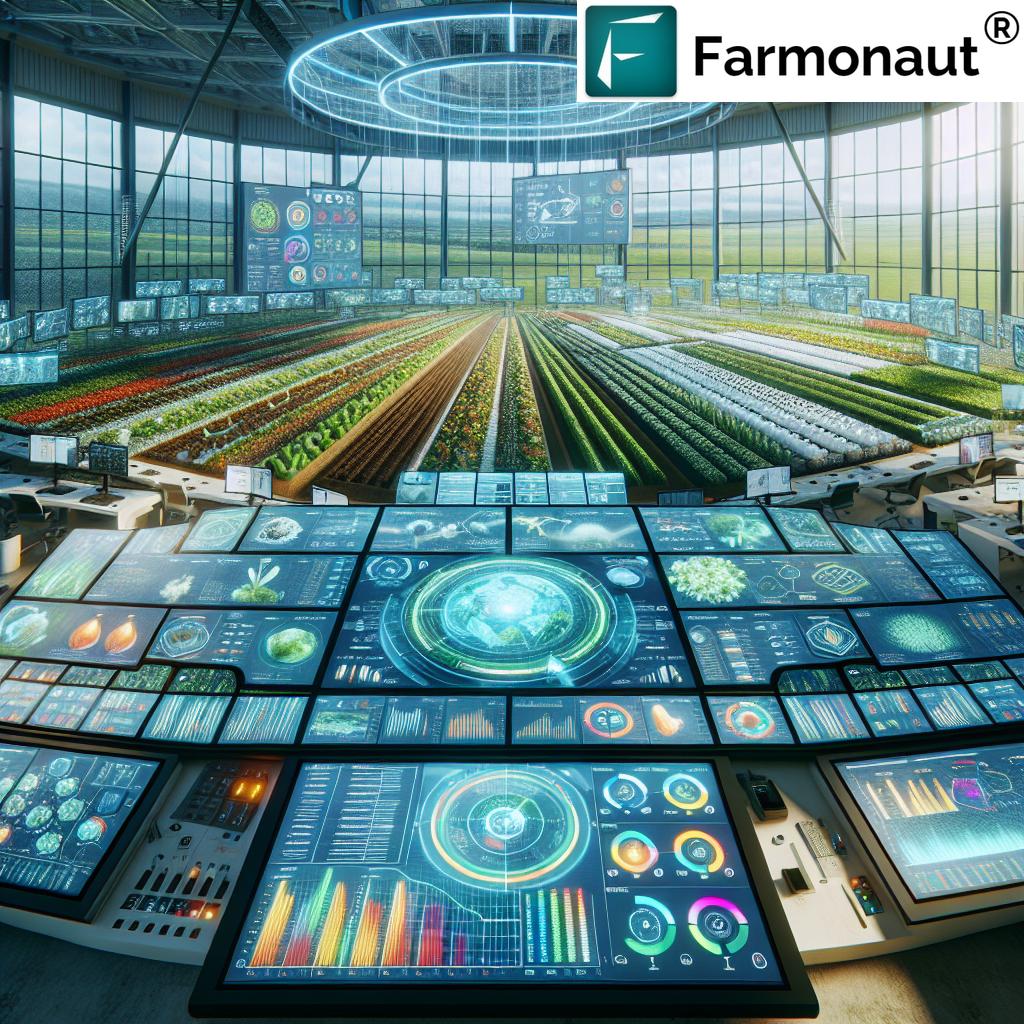
The Role of Agricultural Organizations in Shaping Policy
Agricultural organizations play a crucial role in advocating for farmers’ interests and promoting sustainable practices. In Europe, organizations like Copa-Cogeca represent millions of farmers and agricultural cooperatives, ensuring their voices are heard in policy discussions.
These organizations contribute to the agricultural landscape by:
- Providing policy recommendations to EU institutions
- Facilitating knowledge exchange between farmers
- Promoting best practices in sustainable agriculture
- Supporting research and innovation initiatives
By working closely with these organizations, Farmonaut ensures that our solutions are aligned with the needs of European farmers and the evolving policy landscape.
Access Farmonaut’s API Developer Docs for integration guidance
Adapting to Economic Pressures While Prioritizing Sustainability
European farmers face the dual challenge of adapting to economic pressures while meeting sustainability goals. In Ireland, this balancing act is particularly evident in sectors like dairy and beef production, which are significant contributors to the economy but also face scrutiny for their environmental impact.
Strategies for balancing economic and environmental objectives include:
- Diversification of farm income streams
- Adoption of cost-saving precision agriculture techniques
- Participation in agri-environmental schemes
- Development of value-added and niche products
Farmonaut’s solutions support farmers in this transition by providing tools for resource optimization and cost reduction. Our blockchain-based traceability system also helps farmers tap into premium markets that value sustainable production methods.
Animal Welfare and Plant Health: Pillars of Sustainable Agriculture
Ensuring animal welfare and plant health is crucial for sustainable agriculture. The EU’s Farm to Fork strategy places significant emphasis on these areas, recognizing their importance for food safety, environmental protection, and consumer trust.
Key initiatives in this area include:
- Revision of animal welfare legislation
- Promotion of alternatives to antimicrobials in animal husbandry
- Strengthening of plant health measures to protect biodiversity
- Development of sustainable and resilient food systems
Farmonaut’s technology supports these efforts by providing early detection of crop health issues and enabling precise management of resources, reducing the need for chemical interventions and supporting overall plant and animal health.
The Future of European Agriculture: Global Implications
The transformative changes occurring in Europe’s agricultural landscape have global implications. As one of the world’s largest agricultural producers and exporters, the EU’s shift towards sustainable farming practices sets an important precedent for other regions.
Key trends shaping the future of European agriculture include:
- Increased adoption of digital technologies and precision farming
- Greater emphasis on circular economy principles in agriculture
- Development of climate-resilient farming systems
- Strengthening of local and regional food systems
Farmonaut is committed to supporting this vision of a sustainable agricultural future. Our ongoing research and development efforts focus on enhancing our satellite-based monitoring capabilities and AI advisory systems to meet the evolving needs of European farmers.
Comparison of European Agricultural Sustainability Initiatives
| Country | Initiative Name | Target Sector | Key Objectives | Implementation Timeline | Estimated Impact |
|---|---|---|---|---|---|
| Ireland | Ag Climatise | All agricultural sectors | Reduce GHG emissions, improve biodiversity, enhance water quality | 2021-2030 | High |
| France | Ecophyto II+ | Crop production | Reduce pesticide use by 50% | 2018-2025 | Medium |
| Germany | Ackerbaustrategie 2035 | Arable farming | Promote sustainable crop production practices | 2021-2035 | Medium |
| Netherlands | Circular Agriculture Vision | All agricultural sectors | Transition to circular agriculture model | 2018-2030 | High |
| Spain | Strategic Plan for Organic Production | Organic farming | Increase organic farming area to 25% of total agricultural land | 2018-2030 | Medium |
This table highlights the diverse approaches European countries are taking to promote agricultural sustainability. Ireland’s Ag Climatise program stands out for its comprehensive approach and high estimated impact, reflecting the country’s commitment to leading in sustainable agriculture.
Conclusion: A Sustainable Future for European Agriculture
As we’ve explored throughout this blog, the future of European agriculture is being shaped by a commitment to sustainability, innovation, and resilience. From the ambitious goals of the Green Deal to the grassroots innovations happening on farms across Ireland and the EU, the agricultural sector is undergoing a profound transformation.
At Farmonaut, we’re proud to be part of this journey towards a more sustainable and productive agricultural future. Our satellite-based monitoring, AI advisory systems, and blockchain traceability solutions are helping farmers across Europe adapt to new challenges and seize new opportunities.
As we look to the future, it’s clear that the success of European agriculture will depend on continued innovation, collaboration, and a shared commitment to sustainability. By embracing technologies like those offered by Farmonaut, farmers can not only meet regulatory requirements but also improve their productivity and profitability while contributing to a greener future for all.
Frequently Asked Questions
- What is the European Green Deal and how does it affect agriculture?
The European Green Deal is a set of policy initiatives aimed at making the EU climate-neutral by 2050. For agriculture, it means transitioning to more sustainable practices, reducing chemical pesticide use, increasing organic farming, and reducing nutrient losses and fertilizer use. - How is Ireland contributing to sustainable agriculture in Europe?
Ireland is leading in sustainable agriculture through initiatives like Ag Climatise, which aims to reduce greenhouse gas emissions, improve biodiversity, and enhance water quality. The country is also investing in precision agriculture technologies and renewable energy integration on farms. - What role does technology play in sustainable farming practices?
Technology plays a crucial role in sustainable farming by enabling precision agriculture, which optimizes resource use and reduces waste. Tools like Farmonaut’s satellite-based crop health monitoring and AI advisory systems help farmers make data-driven decisions that improve sustainability and productivity. - How are agricultural organizations influencing policy in the EU?
Agricultural organizations like Copa-Cogeca represent farmers’ interests in policy discussions, provide recommendations to EU institutions, facilitate knowledge exchange, and promote best practices in sustainable agriculture. - What are some key challenges facing European farmers in adopting sustainable practices?
Key challenges include balancing economic pressures with sustainability goals, adapting to new regulations, investing in new technologies, and managing the transition to more sustainable production methods while maintaining productivity and profitability.
For more information on how Farmonaut can support your farm’s transition to sustainable practices, visit our website or download our mobile app today.





